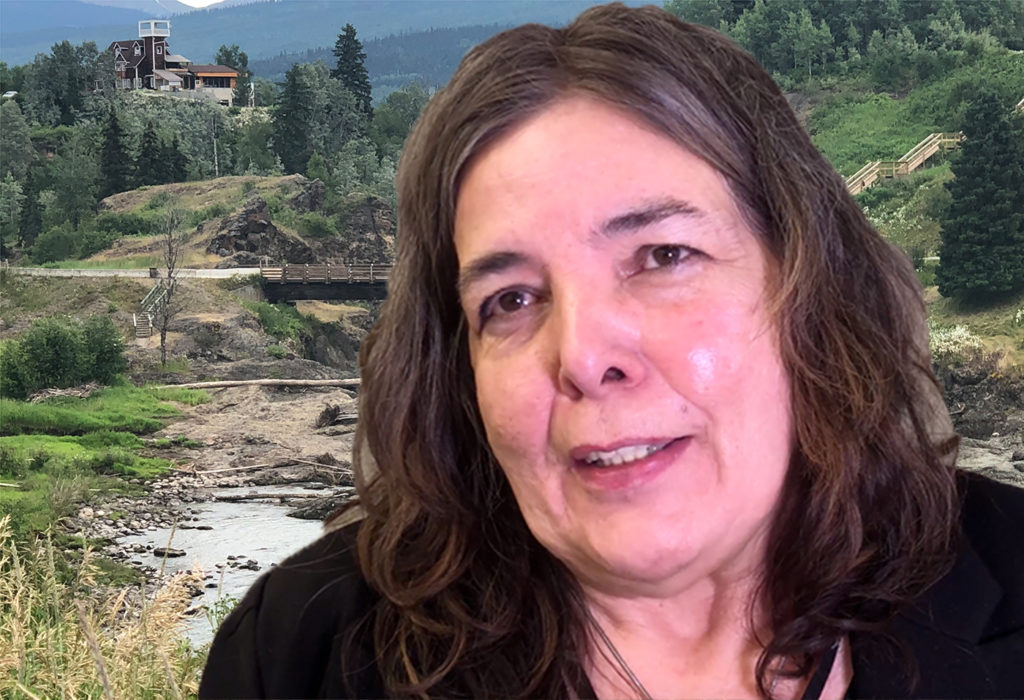Wet’suwet’en Hereditary Chief Wi’hali’yte speaks out.
Also known in Canada as Theresa Tait Day
I want to first confess that we are sort of pirating a story for the greater good of the Wet’suwet’en people. All credits must go to RESOURCE WORKS and we are to some degree publishing their copyrighted article without free and prior consent. (pun intended)
Intimidation attempts are motivation to make it even more important to get the truth out to the Wet’suwet’en people. A story that must be told.
Our heart goes out to Theresa Tait Day who suffered a tragedy no mother or father should ever bear, without the support system the Wet’suwet’en Five keep telling the “Non Aboriginals” about.
A woman hereditary chief speaks out all credits go to https://www.resourceworks.com
VIDEO SERIES: Who speaks for members of the Wet’suwet’en First Nation? That’s at the heart of a controversy involving elected and hereditary representatives of the northwest British Columbia group. We asked Theresa Tait Day, a hereditary chief known as Wi’hali’yte, for her perspective.

It’s a dispute made highly consequential because of its impact on the $40 billion LNG Canada project that depends on a gas pipeline.
Male hereditary chiefs have been trying to exclude women chiefs from hereditary titles because the women have shown that 85 per cent of First Nations members support the $6.2-billion Coastal GasLink pipeline route.
One of the chiefs, Wi’hali’yte (Theresa Tait Day), sat down with Resource Works recently and told her side of the story. The following videos were shot on March 5 in Prince George. The interviewer is our executive director, Stewart Muir.
Explaining the British Columbia hereditary chief system
Hereditary chief Wi’hali’yte (Theresa Tait Day) explains how names are passed down from one generation to the next in the Wet’suwet’en tradition. She argues that some men with hereditary titles have become oppressors of women in the First Nation.
Passing on cultural traditions
Wi’hali’yte explains the means by which cultural leadership knowledge was passed along to her.
Caretakers of the land
What’s the responsibility of a First Nations hereditary chief in the Wet’suwet’en tradition? Turns out with five communities as caretakers of the land it can get complicated. Hereditary chief Wi’hali’yte (Theresa Tait Day) explains.
About the clan tradition
Wi’hali’yte (Theresa Tait Day) provides insight into the traditional matrilineal leadership system of her people, including funeral feasts. More recently, the potlatch system became politicized, she argues.
“We are all leaders, we are equal”
The legacy of the residential school system helps to explain why relations within this First Nation have been made difficult in recent times. A group of male hereditary chiefs recently attempted to strip woman chiefs, including Wi’hali’yte, of their titles - a misogynistic move that she attributes to the men being raised outside of the community without knowledge of Wet’suwet’en traditions. “We can’t afford to hurt each other, we have to stick together,” she says.
Getting a benefit from lands and resources
Why 85 per cent of the First Nation’s members voted in favour of a major project expected to bring jobs and hope to the beleagured community.
Women who struggle for respect in a male-dominated society
A pipeline project through her nation’s territory was improved through application of local knowledge, in spite of opposition from some male hereditary chiefs.
“Poverty kills”: A heart-wrenching personal story
For Wet’suwet’en hereditary chief Wi’hali’yte (Theresa Tait Day), the impetus to improve conditions for her First Nation in British Columbia is devastatingly personal.
EDITORS NOTE: It is not the people manning illegal road blockades that need financial help in hard times. Its the true Wet’suwet’en warriors of “PEACE” who despite internal bleeding pain and suffering, still are doing what they can for the Wet’suwet’en people. Please feel free to offer Theresa help with the cost of her tragic loss. These heroes need your help. Both our system and the Wet’suwet’en failed her in her hour of need.

COPYRIGHT NOTICE

In the event we are using copyrighted material, we are doing so within the parameters of the Fair Dealing exception of the Canadian Copyright Act.
On occasion we may use photos or videos without express permission for education purposes. If we have images on our website that do not incude a copyright users name, it could be for a number of reasons, the first is we might own the image, or it might published under Creative Commons, or we have no idea who owns the image as they may be reader submitted images, please be aware we are not using the images for profit or commercial use, and would be more than happy to give credits and or remove them based on legitimate request.
Fair Dealing is an exception in the Canadian Copyright Act that permits the use of other people's copyright protected work without permission or payment for the purpose of research, private study, education, satire, parody, criticism, review or news reporting.
Please verify if it is NOT a legally embedded photo or video before filing a complaint.
If you are the legitimate copyright owner and object to our usage of the images or want to have credits added, please contact us using our contact page. Please be specific in your description and location to where it is being used. Please supply I with evidence of where it was originally posted legally, and a link to where you claim we are using it.
